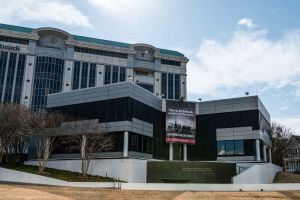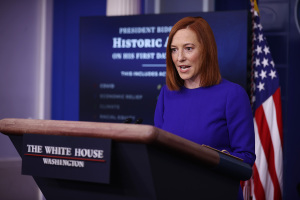Excerpts From John MacArthur's 'Strange Fire' Book Suggest Flames of Controversy Over Charismatic Mov't to Still Burn
Pastor John MacArthur's newest book, Strange Fire: The Danger of Offending the Holy Spirit With Counterfeit Worship, scheduled for release next month, will most likely do little to douse any of the controversy unleashed during his criticism of the Charismatic Movement at his recent conference of the same name.
The Christian Post received an advance copy of the book, and passages and quotes from it can be read below.
MacArthur argued at the Strange Fire Conference held at Grace Community Church in Sun Valley, Calif. on Oct. 16-18 that Pentecostal-influenced preachers like Bishop T.D. Jakes and Joel Osteen are advancing a prosperity gospel that is "spirit-centered" when it should be Christ-centered, as well as other controversial remarks.
"If the Charismatic movement was being produced by the Holy Spirit, the glory of Christ would prevail everywhere," said MacArthur in one morning conference session. "It would be Christ-dominated and everyone in the movement would be bowing the knee to the true Christ in belief of the true Gospel."
Supporters of the Charismatic Movement have fired back. Rev. Samuel Rodriguez, a Pentecostal minister and president of the National Hispanic Christian Leadership Conference, sent a statement to The Christian Post declaring that MacArthur has "spiritual, cultural and theological myopia."
"With great due deference to a Christian leader many of us admire, his conclusions regarding the largest and fastest growing of global Christendom, the Pentecostal/Charismatic movement, speaks to a man ignorant of the community's unbridled commitment to biblical orthodoxy," said Rodriguez.
"Mr. MacArthur should be focusing on the fact that while many in the church continue to abandon our Christian faith, the Pentecostal/Charismatic community continues to offer the church a legitimate growth mechanism."
Wallace Henley, senior associate pastor of Houston's Second Baptist Church, wrote in a column for The Christian Post that MacArthur's work is a form of "distracting extremism."
"John MacArthur is right that the church in this critical hour cannot risk taking the wrong course regarding the ministry and manifestation of the Holy Spirit. But his position seems to reject the possibility of there being anything good about the charismatic movement," wrote Henley. "Sound doctrine must not be an immobilizing anchor for the church, but her sturdy, balancing keel midst the upheavals. John MacArthur's extreme 'form' approach is a regrettable distraction from attaining and maintaining the critical equilibrium between form and frenzy."
MacArthur's ministry, Grace To You, published a post on its website yesterday that asks, "What now?"
"The first step is to be humble," the ministry states. "No one has ever been forced into God's kingdom. Rather than hammering friends and family with theological arguments, we need to keep in mind the focus of the conference - the sufficiency of Scripture and the true work of the Holy Spirit. Lovingly proclaim those truths."
The author(s) of the Grace To You post continued, "On the other side of the debate, there are undoubtedly charismatics and continuationists who were unswayed - and possibly even angered- by Strange Fire. If you are one of those people, we would still plead with you to consider and apply three important points raised during the conference that will benefit you and your church."
The points included a plea to not judge the conference based on sound bites, to carefully evaluate "your view of Scripture," and to "consider how you can benefit the charismatic movement from the inside."
In the introduction of his book, MacAruther discusses the origins of "strange fire" as derived from an incident in the Old Testament, in which two Israelites named Nadab and Abihu were struck dead by God for burning incense in the temple at the wrong time and for using fire not taken from the altar.
"The actual source from which they obtained their fire is not recorded. Nor is it important. The point is they used something other than the fire God Himself had ignited," wrote MacArthur in the introduction to Strange Fire. "This is a sobering and terrifying account, and it has obvious implications for the church in our time."
Quotes and statements taken from CP's advanced copy of Strange Fire below are followed with page numbers from the book.
"The real Holy Spirit is not an electrifying current of ecstatic energy, a mind-numbing babbler of irrational speech, or a cosmic genie who indiscriminately grants self-centered wishes for health and wealth." (xiv)
On Fuller Theological Seminary: "…a mainstream evangelical school that had abandoned its commitment to biblical inerrancy in the early 1970s…" (xvii)
Corruption of Worship: "Charismatic theology…has warped genuine worship through unbridled emotionalism, polluted prayer with private gibberish, contaminated true spirituality with unbiblical mysticism, and corrupted faith by turning it into a creative force for speaking worldly desires into existence."(xvii)
Christlikeness over Flamboyance: "Those who have had a charismatic experience have been baptized with the Spirit, they say-and that supernaturally empowers obedience, fosters holiness, and produces the fruit of the Spirit. If their claims were true, charismatics ought to be producing leaders renowned for Christlikeness rather than flamboyance. Moral failures, financial chicanery, and public scandals would be comparatively rare in their movement."(5)
New Age Parallel: "Influenced by TV's most popular preachers, many charismatics treat the sovereign Spirit of God as if He were their slave-a heavenly butler bound to wait on their every command. Their teaching is not substantially different from the New Age poison popularized by the 2006 international best seller, The Secret, in which author Rhonda Byrne suggests, 'You are the Master of the universe, and the Genie is there to serve you.'"(8)
Scriptural Authority: "If Scripture alone were truly their final authority, charismatic Christians would never tolerate patently unbiblical practices-like mumbling in nonsensical prayer languages, uttering fallible prophecies, worshipping in disorderly ways, or being knocked senseless by the supposed power of the Holy Spirit." (16)
On comparing Charismatic Movement to the Day of Pentecost described in Acts 2: "the Charismatic Movement…grew out of the deficient soteriology of the Holiness Movement; it was marked by inconsistent eyewitness testimony; it produced counterfeit religious experiences; and it was initiated by a disreputable spiritual leader." (28)
On Catholic Charismatics: "Though Catholic charismatics hold to Roman Catholic doctrine-including Rome's denial that believers are justified by faith alone, belief in the ex opere operato efficacy of the seven Roman sacraments, all the idolatry of the Catholic Mass, and the idolatrous veneration of Mary-they have been openly embraced by many Protestant Pentecostal and charismatic groups." (49)
Evidence of the Spirit: "Despite what is commonly emphasized in charismatic circles, the genuine evidence of the Holy Spirit's influence in a person's life…convicts the heart of sin, combats worldly lusts, and cultivates spiritual fruit in the lives of God's people." (56)




























